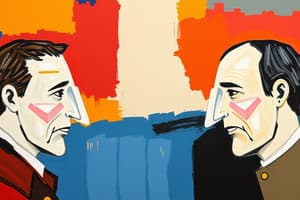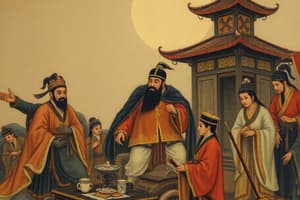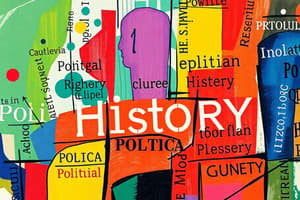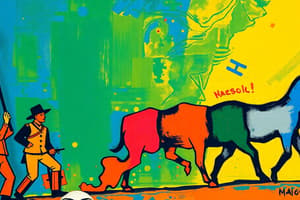Podcast
Questions and Answers
What are rotten boroughs?
What are rotten boroughs?
- Locations for political rallies
- Regions with abundant resources
- Areas with a high population density
- Places of voter fraud (correct)
What was a vice-admiralty court?
What was a vice-admiralty court?
A court where a single judge issued a verdict without a jury.
What does virtual representation mean?
What does virtual representation mean?
- Parliament's representation of British subjects irrespective of geography (correct)
- A form of independent local governance
- No taxation without representation
- Directly electing members of parliament
Who were the Sons of Liberty?
Who were the Sons of Liberty?
What does homespun mean?
What does homespun mean?
Who were the Minutemen?
Who were the Minutemen?
Popular sovereignty means that political power rests with the government.
Popular sovereignty means that political power rests with the government.
Who was George Grenville?
Who was George Grenville?
What was the purpose of the Sugar Act?
What was the purpose of the Sugar Act?
What did the Stamp Act tax?
What did the Stamp Act tax?
Who was Patrick Henry?
Who was Patrick Henry?
What were the Townshend Acts?
What were the Townshend Acts?
What did the Coercive Acts do?
What did the Coercive Acts do?
Who was Thomas Paine?
Who was Thomas Paine?
Who was King George III?
Who was King George III?
Flashcards are hidden until you start studying
Study Notes
Electoral Manipulation and Legal Systems
- Rotten boroughs: Areas with voter fraud; non-existent locations used for voting, allowing manipulation in parliamentary representation.
- Vice-admiralty court: Judicial system where a single judge issued verdicts without a jury; part of the Sugar Act, causing colonial resentment over its perceived overreach.
Revolutionary Concepts and Organizations
- Virtual representation: Concept introduced by George Grenville justifying Parliament's right to tax colonists despite their lack of direct representation, asserting that MPs represent all British subjects.
- Sons of Liberty: Radical group formed in 1765 after the Stamp Act, known for protests and riots; instrumental in creating Committees of Correspondence post-Stamp Act repeal.
Key Figures and Events
- George Grenville: British Prime Minister behind the Sugar and Stamp Acts; sought to enforce taxation and limit colonial smuggling; faced significant unpopularity in the colonies.
- Patrick Henry: Influential founding father advocating for colonial rights; famous for his "Give me liberty, or give me death!" speech.
Taxation and Legislative Acts
- The Sugar Act (1765): Taxed colonists 3 cents for sugar to address debt from the French and Indian War; targeted smuggling by imposing stricter measures.
- The Stamp Act: Required stamps on various printed materials to signify tax payment; affected newspapers, legal documents, and even playing cards.
Social Movements and Reactions
- Minutemen: Local militia ready for quick action against British forces during the Revolutionary War, recognized for their rapid response capability.
- The Coercive Acts (Intolerable Acts): Enacted after the Boston Tea Party; included closing Boston Harbor and mandating housing for British soldiers; heightened colonial fears of tyranny and unity against Britain.
Influential Literature
- Thomas Paine: Author of "Common Sense," published in 1776; emphasized the colonies' need for independence and criticized British governance, significantly swaying public opinion towards revolution.
Monarchical Authority
- King George III: Reigned from 1760 to 1820; was deeply involved in colonial governance; his rejection of the Olive Branch Petition led colonists to perceive him as a tyrant, intensifying revolutionary sentiments.
Political Philosophy
- Popular sovereignty: Principle asserting political power belongs to the people, exercised through voting and participation in government processes, underscoring the foundation of American democracy.
Additional Political Figures
- Charles Townshend: Politician known for persuasive speeches; introduced the Townshend Acts in 1767, attempting to impose indirect taxes that ultimately sparked colonial opposition.
Studying That Suits You
Use AI to generate personalized quizzes and flashcards to suit your learning preferences.




